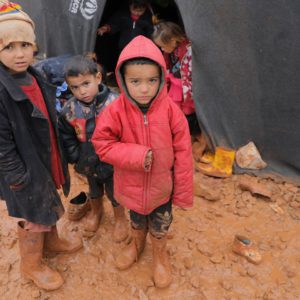The Syrian refugee crisis to this day, the largest displacement crisis in the world. Nearly 25 million people are in need of humanitarian assistance, with 32 percent of them children, or roughly 8 million.
Aside from the inadequate assistance received by Syrian refugees, the impact of the COVID-19 pandemic on refugee-hosting countries like Lebanon, Turkey, Egypt, Jordan, and Iraq has not made it more accessible. The pandemic has led to a massive reduction in Syrian families’ access to health care, education, and child protection services. All in all, this resulted in poor physical and emotional well-being among children.
The United Nations Children’s Emergency Fund (UNICEF) supports refugees and host communities throughout the pandemic. Here are the most significant statistics released by the global children’s aid in the first quarter of 2021:
- 71,660 Syrian refugees were given access to safe water for drinking, cooking, and personal hygiene in Iraq.
- Over 42,000 Syrian children aged five and under were screened for malnutrition to address the worsening malnutrition numbers in the refugee-hosting country Lebanon. The Primary Health Centres (PHCs) that conducted the screening worked to detect, manage, and prevent malnourishment in children.
- 774,257 Syrian children, with 49 percent of them girls, were enrolled in formal pre-primary to Grade 12 education in public schools in Turkey.
- More than 38,000 Syrian children and caregivers had access to mental health and psychological support, either in-person or online, to uphold the delivery of child protection in Jordan.
- 12,232 consultations with children refugees and 2,541 consultations with women refugees were recorded in the first quarter of 2021 in Egypt. This is part of the advocacy to continue essential health care services such as immunization, growth monitoring, and antenatal care service.
A decade of hostilities in the Syrian Arab Republic has driven 5.6 million registered refugees, with 2.5 million of them children, to live in refugee camps, informal settlements, and urban settings in refugee-hosting countries.

This situation was made worse by the COVID-19 pandemic and the economic downturn it caused in 2020. Of the 19.8 million refugees, 3.1 million of them needed water, sanitation, and hygiene (WASH) assistance; 3.3 million children needed child protection services; and 4.8 million children needed educational support.
While host countries provide public services, refugees remain vulnerable due to a lack of livelihood opportunities, worsening inequalities, and economically strained institutions. And while both Syrian refugees and community households in host countries face similar problems, refugees face more vulnerabilities due to their legal status, residency, and labor policies restricting their mobility.
Moreover, the COVID-19 crisis has made refugees more prone to psychosocial distress, child labor, and domestic and sexual violence. Some women refugees have also resorted to child and forced marriage as a negative coping mechanism to the economic hardships and lack of essential care. The other socio-economic impacts of the pandemic also disrupted refugees’ access to health care, learning, and vaccinations and increased food insecurity and child poverty.
Conclusion
Syrian refugees have been battling socio-economic vulnerabilities and psychosocial challenges due to a decade of hostilities in the Syrian Arab Republic. But the COVID-19 pandemic has amplified the refugees’ immense need for assistance and protection and has shed light on the poor aid they receive despite efforts to meet them.
More importantly, Syrian child refugees are at the center of these vulnerabilities, and a call for the world’s assistance is magnified now more than ever.
The Union of Medical Care and Relief Organizations – USA (UOSSM USA) is a nonprofit, independent, charitable medical humanitarian organization in Texas, providing medical relief, emergency lifesaving aid, and healthcare to those affected by the Syrian crisis. UOSSM USA is committed to its mission of medical assistance by partnering with local communities and organizations worldwide to reach crisis-stricken communities.
Help Syrian child refugees by volunteering, donating, and advocating for them. Your help can greatly benefit child refugees suffering from physical injuries and emotional distress caused by the war. Take part in a cause that works to save lives and build hope amid the crisis. Visit our website to see how you can help.



